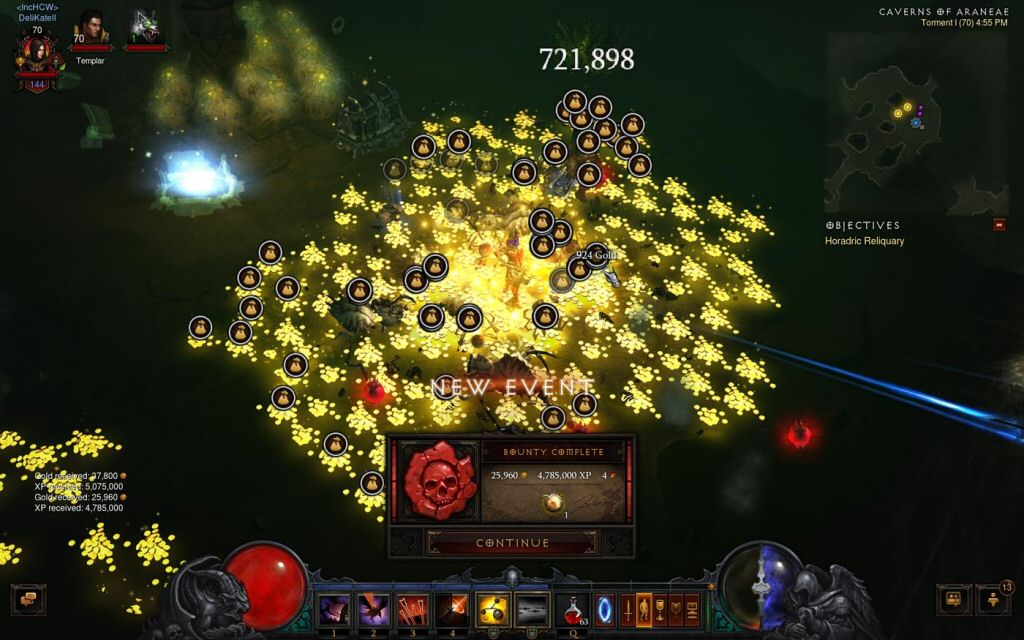This Dumb Industry: Loot Boxes Are Not Gambling?
Last week the ESRB decided that
Loot Boxes are not gambling. We’re talking about “loot boxes” in the sense of in-game rewards, not “
loot crates“, the physical merch you can subscribe to. Also remember that the ESRB is a non-government, non-profit, self-regulatory organization. They’re the equivalent to the
MPAA in the realm of Hollywood films.
I haven’t played a lot of games that use loot boxes. I played Counter-Strike, but that was in decades past, long before loot boxes. I played Team Fortress 2, but I was losing interest in the game just as the loot-based economy was taking off. (And there the boxes are free, but the keys to open them cost money.) I played the original Titanfall in online multiplayer, but I only spent a few evenings with it and I certainly never bought any microtransaction stuff. The point I’m getting at is that I have basically zero experience with boxes of the lootish variety. I can’t speak with any authority on how the the process works or how exploitative it might be. I’m not really here to convince you in-game loot packages are a good thing or a bad thing, only that I think this debate over “gambling” is an interesting one.
For reference, here is how I understand the system: The game will have some sort of reward-over-time mechanic where you slowly earn “boxes” of in-game items. The contents of the boxes are random. In the games we’re talking about in regards to this particular ESRB rating, these games will also offer you a choice to outright buy these boxes for real money. The trick is that not all boxes are created equal. Some boxes contain things that are so common they’re basically worthless, and some boxes contain exotic in-game goods that can only be obtained through boxes. Again, every game is a little different. Sometimes there’s a meta-currency somewhere along the process and sometimes the boxes are given randomly instead of over time, but this is the idea in broad strokes.
When the ruling was announced, the overwhelming response was, “DUH! OBVIOUSLY THIS IS GAMBLING HOW CAN YOU BE SO BLIND?!”
My response was, “How interesting. What do you mean by ‘gambling’?”
It turns out this is one of those insidious discussions where everyone has a slightly different ad-hoc definition that they assume is universal to all.
What’s At Stake
In the ESRB system, there’s “simulated gambling” and “real gambling”. If a game is categorized as “real gambling” then it gets slapped with the dreaded Adults Only rating. This is a more serious category than “Mature”, which is where stuff like Grand Theft Auto winds up. Adults Only is usually given to stuff like pornographic games. Stores won’t carry AO titles, which means that it’s basically the kiss of death for a game. If a certain system is considered real gambling then developers will stop using it, because nobody in the AAA space can afford to take that kind of risk.
Lots of people hate this loot box business, and so they really want to see it categorized as gambling so developers will be forced to stop putting it in their games. They figure if the game meets
any possible definition of gambling then it should be classified as gambling. While I sympathize with the desire to see this business practice die, this sort of regulatory sledgehammer is probably a bad way to go about solving that particular problem.
Imagine you hate modern military shooters, so you get them classified as “pornography” on the basis of them containing “gun porn” in the form of modern real-world weapons. You pat yourself on the back, thinking the industry won’t be dominated by the likes of
Call of Duty or
Battlefieldanymore. But using this trick means that many other games will get caught in your regulatory net. Suddenly a bunch of turn-based strategy games you love are pulled from the shelves because they also feature real-world firearms, and it was already hard enough to get your hands on that kind of thing. Meanwhile, Call of Duty just replaces their machine guns with pew-pew lasers and the industry continues on as before.
I know this sounds far fetched, but consider this: If loot boxes are gambling, then what about Hearthstone and other collectible card games? Random packs of goods are a much larger part of those games than the shooters we’re talking about. You could end up causing a lot of collateral damage and creating problems for other fanbases. Meanwhile, there’s no guarantee these publishers won’t replace their loot boxes with something even more obnoxious.
For example, if you rule that loot boxes are “real gambling” then the publishers could easily replace them with (say) pay-to-fight bosses. Pay some money, fight the (completely pushover) boss, and the boss drops what would have originally been inside of the box. To the publisher, it’s the same deal: Randomized loot for money. They can always keep adding different steps to the process until they’ve effectively routed around your definition of gambling. If you’re trying to get rid of loot boxes by having them classified as gambling, then you’ll end up in a never-ending game of
rules-lawyering. And you really don’t want to play that game against companies who have a staff of real-world lawyers, because they literally do this for a living.
“For Every Complex Problem, There Is an Answer That Is Clear, Simple, and Wrong.”
H.L. Mencken
never actually said this but it’s still a fun quote.
We can agree that slot machines are gambling, right? You put in money[1], and sometimes you get money out. Gambling, right?
And I think most of us can agree that breakfast cereal is not gambling, even if the box might contain a prize and even if that prize can vary significantly in value based on random chance. You pay money for cereal and you might get something of unpredictable value. Despite this, it’s usually considered
not gambling.
What I hope you’ve noticed by now is that it’s hard to draw a clear line between these two. You can push breakfast cereal into the realm of gambling by increasing the potential value of the prize. If the box might contain a ticket for a million dollars or the keys for a new car then people might treat the cereal like lottery tickets: Buy the box and throw away the food because all you care about is the prize. I think that would count as gambling to most people. Likewise, you could change a slot machine to dispense goods rather than money and end up with a machine that isn’t considered “gambling”, even thought it clearly is. In fact, that’s what a
prize grabber is. It’s a game of chance masquerading as a game of skill where you pay money for a chance at a non-cash prize.
In the United States, there are laws against certain kinds of gambling. The thinking is that lotteries exploit the poor and desperate, so if you try to run one you will go to jail. (Unless, of course, you’re a state government,
89% of which make an exception only for themselves.) Obviously there are still prizes offered by companies as part of various promotions. McDonald’s ran their
McMillions program for years. Other companies give away cars and trips and piles of money.
The trick here is that it’s only a lottery in the legal sense[2] if people must to pay to enter. If you can get a chance to win for free, then it’s not technically “gambling”. So in order to comply with the law, companies must offer some way to get a chance to win for free. They tend to make this method really inconvenient, like asking you to mail them an already-stamped envelope, thus making you pay for postage both ways. You get one entry per envelope, so if you want to enter ten times then you’re going to spend a lot of money on stamps and a lot of time filling out envelopes. This is inconvenient enough to make spamming for free entries unattractive, thus encouraging people to just BUY THE STUPID PRODUCT YOU CHEAP BASTARD.
When we’re talking about the definition of “gambling” we’re usually doing so because we’re trying to regulate or control it. Usually this is in the context of governments, but with the ESRB we’re talking about a non-profit organization with voluntary compliance. In order to nail down the definition, I think you need to consider these questions:
- Is it a game of chance? (As opposed to a carnival game where you throw balls or shoot targets.)
- Do you have to pay real money – either directly or by buying a given product – in order to play it?
- Does the game pay out in cash, or in goods and services?
- Is the opportunity itself the product (lottery) or is it simply a marketing tool for an unrelated product (breakfast cereal prizes) that would still be viable without the prize?
Depending on how you answer these, you might conclude that only slot machines and roulette wheels are actually gambling, or you might conclude that playing a Diablo clone is gambling. Heck, you could argue that pre-ordering games is more like real gambling than loot boxes. It’s easy to come up with a definition that seems reasonable and then realize you’ve accidentally included or excluded something obviously inappropriate.
What I’m getting at is that I understand this sort of thing is tough and I think reasonable people can have very different definitions of what gambling is.
The Rationale
I wanted to trace this story back to the source, but the ESRB doesn’t issue press releases or post official statements on
their site. So if you want something official you have to email them and then post their reply, which means we can’t have a definitive link that can be cited for reference and the whole thing turns into a game of telephone.
Since we’re playing telephone, the best I can do is quote
Kotaku’s email from the ESRB where they explain why loot boxes aren’t gambling.
While there’s an element of chance in these mechanics, the player is always guaranteed to receive in-game content (even if the player unfortunately receives something they don’t want) We think of it as a similar principle to collectible card games: Sometimes you’ll open a pack and get a brand new holographic card you’ve had your eye on for a while. But other times you’ll end up with a pack of cards you already have.
While I wouldn’t personally rule that loot boxes are “real gambling”, I think this particular justification is an odd one. I’d lean towards ruling that it’s not gambling because the things you “win” are
non-liquid and non-transferable. People don’t buy these things to gain wealth, which is the danger we often associate with gambling. But instead the ESRB based their decision on the fact that you always “get something”. I’m betting[3] this rationale exists to protect titles like Hearthstone. Still, if you use their definition that it’s not gambling if you always “get something” then even the lottery isn’t gambling because if you lose you still “get” something. (A worthless bit of paper.)
So I agree with the ESRB’s conclusion, even if I disagree on how they got there. In any case, I doubt we’ll get rid of loot boxes by classifying them as gambling. Now if you don’t mind, I’m going back to my single-player games. Those don’t have loot boxes.
Yet.































